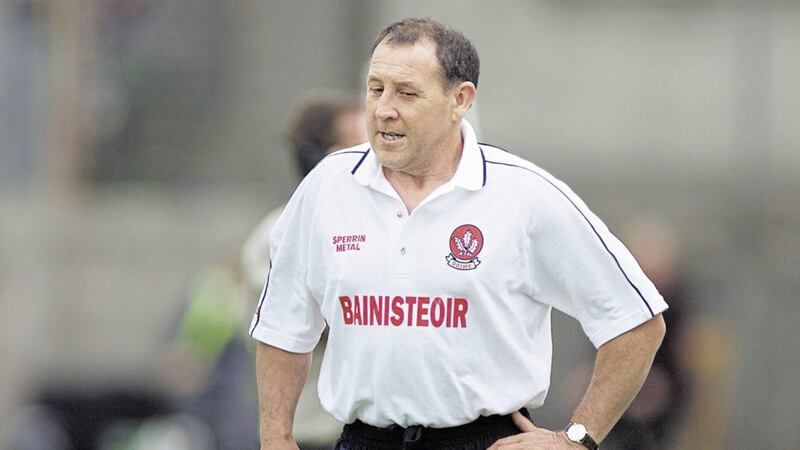'''Must be the nice smile, I have,’ turn of the head, flash, grin. He does that, he disarms you, devilment dancing from every pore, his smile is full frontal enamel and his green eyes wrinkle and spark.”
With such words falling in tune like a traditional jig, Maria McCourt’s forthcoming book on the late Derry GAA legend Eamonn Coleman layers itself with a hallmark of great story-telling.
And if ever anyone could conceive the ingredients of a great Irish story, by God it was Eamonn Coleman’s short-lived fiery reign as Derry’s successful manager, taking the county to all-Ireland football glory in 1993 – 25 years ago next month.
The soil of south Derry dripping from his brogue, Eamonn’s boiling wee frame could burst with temperamental energy, while his lough shore blood guaranteed that wily ways were mixed with the old-school gold of good manners and a big heart.
Throw in the big ‘P’ politics affecting Ulster’s GAA in the early 1990s, the small ‘p’ politics of county boards and personalities, the bruising battles of all-Ireland success after lifetimes of county failure, the handling of amateur players in an era of genuinely limited resources, and the ultimately tragic burden of cruel and unfair illness, and the broth of a great book bubbles over.
But Maria isn’t only a writer and former editor (guarding my own copy in the newsroom for a few years), nor is she just a fanatical Derry GAA fan. She was also Eamonn Coleman’s god-daughter and niece, in whom he confided taped interviews that began around 15 years ago before his untimely death, aged just 59, in 2007.
And while ‘The Boys of ‘93’ hits shelves in a few weeks and promises to be a great read for Derry folk and GAA people, Maria’s story-telling works primarily because of its deeply personal insight and character.
And that’s the thing about great stories, and story-telling. It is the personal ethic of people driving their own record of history that tells the most worthwhile tales in life. The honest, ethical motivation of writers is always central to the successful engagement of readers. Crucially, an honest writer’s good ethic means you don’t have to agree with every word.
Compare that with commercial sports, politics, business, marketing, whatever – or the unfathomable ego of the self-financed, self-published (self-serving) autobiography.
Too often these days, the idea of personal story-telling gets trammelled into the Machiavellian world of 'message control'. Sports stories must be about branding. Political stories must be about propaganda. Business stories must be about sales. Stories are only useful to institutions if they serve a material purpose – like money, votes or growth.
And yet the greatest stories ever told are those that pour from the heart. The stories that leave friends rolling in laughter, long after punchlines have left the room. The stories that heave foes to the table of understanding, long after disputes have lost their meaning. The stories that flood tears into wedding rooms and wake houses, for the celebration of lovers or the sadness of lost lives.
We talk a lot about story-telling as one way to deal with the legacy of armed conflict. Personal story-telling undoubtedly has its place in that context, with historical facts and reports and truths being recorded accurately.
The thing is this: that when reading good stories we usually sit in silence and concentrate on the words - looking for meaning, whereas, when hearing ‘opponents’ speak, the megaphone tones often provoke reaction and we lose the objective of listening.
Ultimately, we each hold an epic existence just by being alive today. Each of us truly is a Ulysses voyaging towards our own individual Ithaca, our lives laden with an amazing potential of talents and powers to do the greatest things; each experiencing an unbelievably immense odyssey, venturing through thoughts and moments of madness and beauty and dreams every heartfelt second.
We all have individual stories of greatness within us, even at the seemingly smallest scale. We should start telling them to each other, putting our own words onto the wonder of our special journeys, and then weaving them together with a love that also listens to stories of other people – helping us to stretch beyond our own shorelines, to see the far side.
We don’t need to conquer the Sam Maguire Cup. We just need to truly tell stories that inspire others to their very best, or that help to gently mend someone’s heart. (Maybe just our own.)
And if Eamonn Coleman’s ‘turf-futtin’ dialect and Maria McCourt’s brilliant writing can inspire more genuine, authentic story-telling, then ‘The Boys of ‘93’ will have achieved far greater than any all-Ireland victory.








